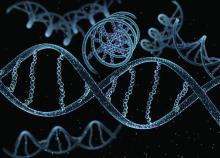Thus, CRC “has a substantial heritable component, and may be more heritable in women than men,” Rebecca E. Graff, ScD, of the Harvard T.H. Chan School of Public Health, Boston, and the University of California, San Francisco, and her colleagues wrote. “Siblings, and particularly monozygotic cotwins, of individuals with colon or rectal cancer should consider personalized screening,” they added.
Having a first-degree relative with CRC doubles to triples the risk of this disease, the researchers noted. About one in five CRC patients has an affected relative, but less than 10% of inheritance is autosomal dominant, and common risk loci explain only about 8% of CRC heritability. Genomewide association studies have identified more than 50 susceptibility variants for CRC, but these explain only 1%-4% of genetic variation in CRC. Previous studies of twins found that 9%-35% of these cancers were heritable, but Dr. Graff and her associates obtained estimates of about 15% after accounting for censoring and competing risk of death. To better pinpoint CRC heritability by sex and age, the investigators compiled data from 39,990 monozygotic and 61,443 same-sex dizygotic twins from the Nordic Twin Study of Cancer, which included population-based twin registries from Denmark, Finland, Norway, and Sweden. Between 1943 and 2010, a total of 1,861 participants were diagnosed with colon cancer and 1,268 were diagnosed with rectal cancer. If a monozygotic twin developed CRC, his or her twin had about a threefold higher risk of CRC than did the overall cohort (familial risk ratio, 3.1; 95% confidence interval, 2.4-3.8). If a dizygotic twin developed CRC, the same-sex twin had about twice the risk of that of the rest of the cohort (FRR, 2.2; 95% CI, 1.7-2.7). For both monozygotic and same-sex dizygotic twins, the familial risk ratios for colon cancer and rectal cancer were slightly higher (3.3 and 2.6, respectively) than for CRC overall. “These differences could reflect limited power but also could indicate shared genetic factors contributing to both [cancer] sites,” the researchers wrote.The model that best fits the data accounted for additive genetic and environmental effects, the researchers said. Based on this model, genetic factors explained about 40% (95% CI, 33%-48%) of variation in the risk of CRC. Thus, the heritability of CRC was about 40%. The estimated heritability of colon cancer was 16% and that of rectal cancer was 15%, but confidence intervals were wide, ranging from 0% to 47% or 50%, respectively. Individual environmental factors accounted for most of the remaining risk of colon and rectal cancers.
“Heritability was greater among women than men and greatest when colorectal cancer combining all subsites together was analyzed,” the researchers noted. Monozygotic twins of CRC patients were at greater risk of both colon and rectal cancers than were same-sex dizygotic twins, indicating that both types of cancer might share inherited genetic risk factors, they added. Variants identified by genomewide association studies “do not come close to accounting for the disease’s heritability,” but, in the meantime, twins of affected cotwins “might benefit particularly from diligent screening, given their excess risk relative to the general population.”
Funders included the Ellison Foundation, the Odense University Hospital AgeCare program, the Academy of Finland, and US BioSHaRE-EU, and the European Union’s Seventh Framework Programme, BioSHaRE-EU, the Swedish Ministry for Higher Education, and the Karolinska Institutet, and the National Cancer Institute. Dr. Graff had no conflicts of interest.


